Hofstede's Dimensions: Singapore and UAE Cross-Cultural Mgmt
VerifiedAdded on 2023/04/21
|15
|4297
|267
Report
AI Summary
This report explores the cross-cultural management challenges faced by Singaporean firms when conducting business in the United Arab Emirates (UAE). It begins by highlighting the importance of cultural awareness in international business, contrasting the cultural landscapes of Singapore and the UAE, with Singapore showcasing a blend of Malaysian, Indian, Indonesian, and Chinese influences, while the UAE's culture is deeply rooted in Islam. The report then delves into Geert Hofstede's six-dimension cultural model (Power Distance, Individualism, Masculinity, Uncertainty Avoidance, Long Term Orientation, and Indulgence) to analyze cultural differences between the two nations. Singapore exhibits lower scores in Power Distance, Individualism, and Long-Term Orientation, suggesting a more balanced and liberal culture conducive to international business, whereas the UAE generally scores higher in these dimensions. The report discusses how these cultural differences impact leadership, negotiations, and ethical considerations in a business context, emphasizing the need for adaptable leadership styles, effective negotiation strategies, and ethical awareness. It concludes by offering recommendations for Singaporean firms to navigate these cross-cultural complexities successfully, highlighting the importance of cultural sensitivity and understanding in fostering positive business relationships and achieving sustainable growth in the global market.
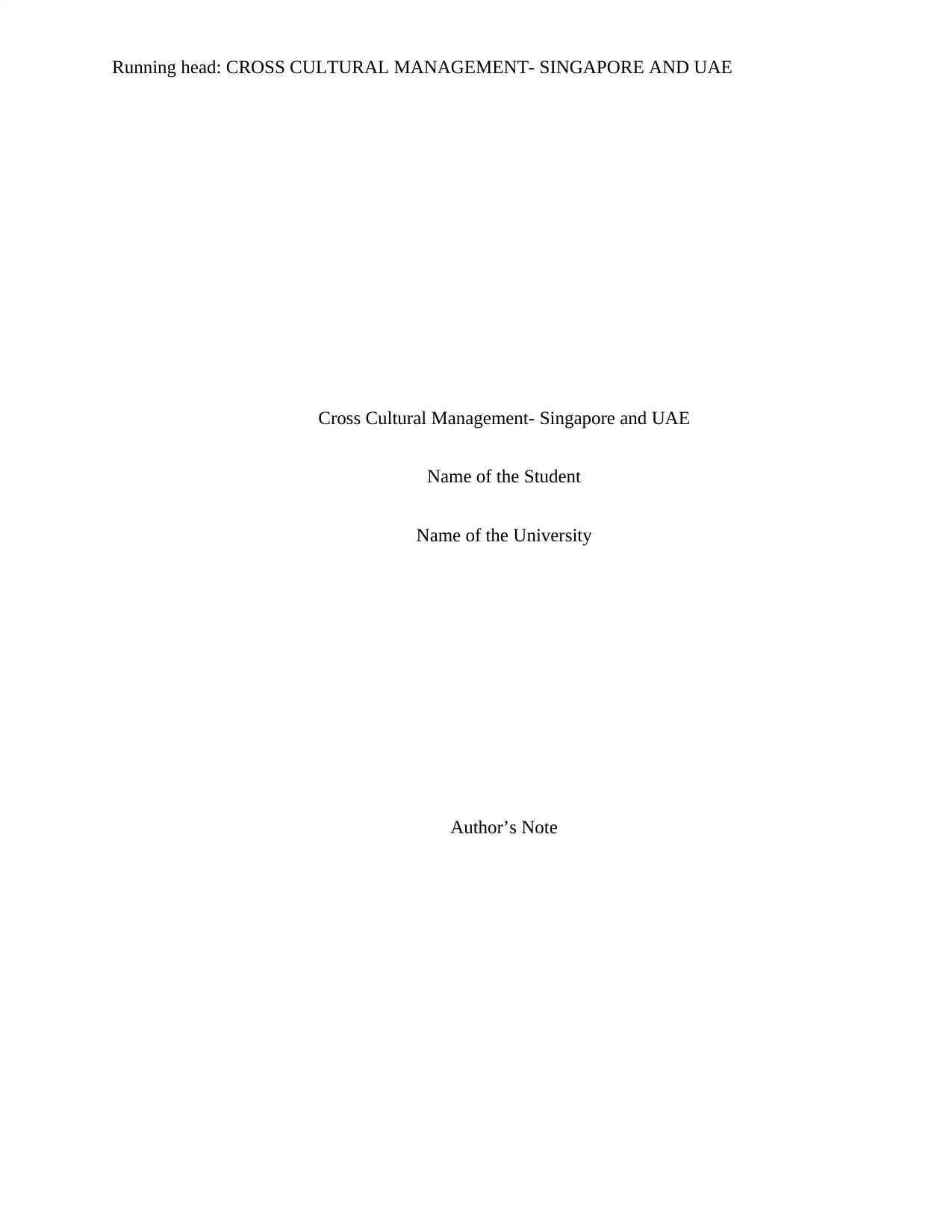
Running head: CROSS CULTURAL MANAGEMENT- SINGAPORE AND UAE
Cross Cultural Management- Singapore and UAE
Name of the Student
Name of the University
Author’s Note
Cross Cultural Management- Singapore and UAE
Name of the Student
Name of the University
Author’s Note
Paraphrase This Document
Need a fresh take? Get an instant paraphrase of this document with our AI Paraphraser
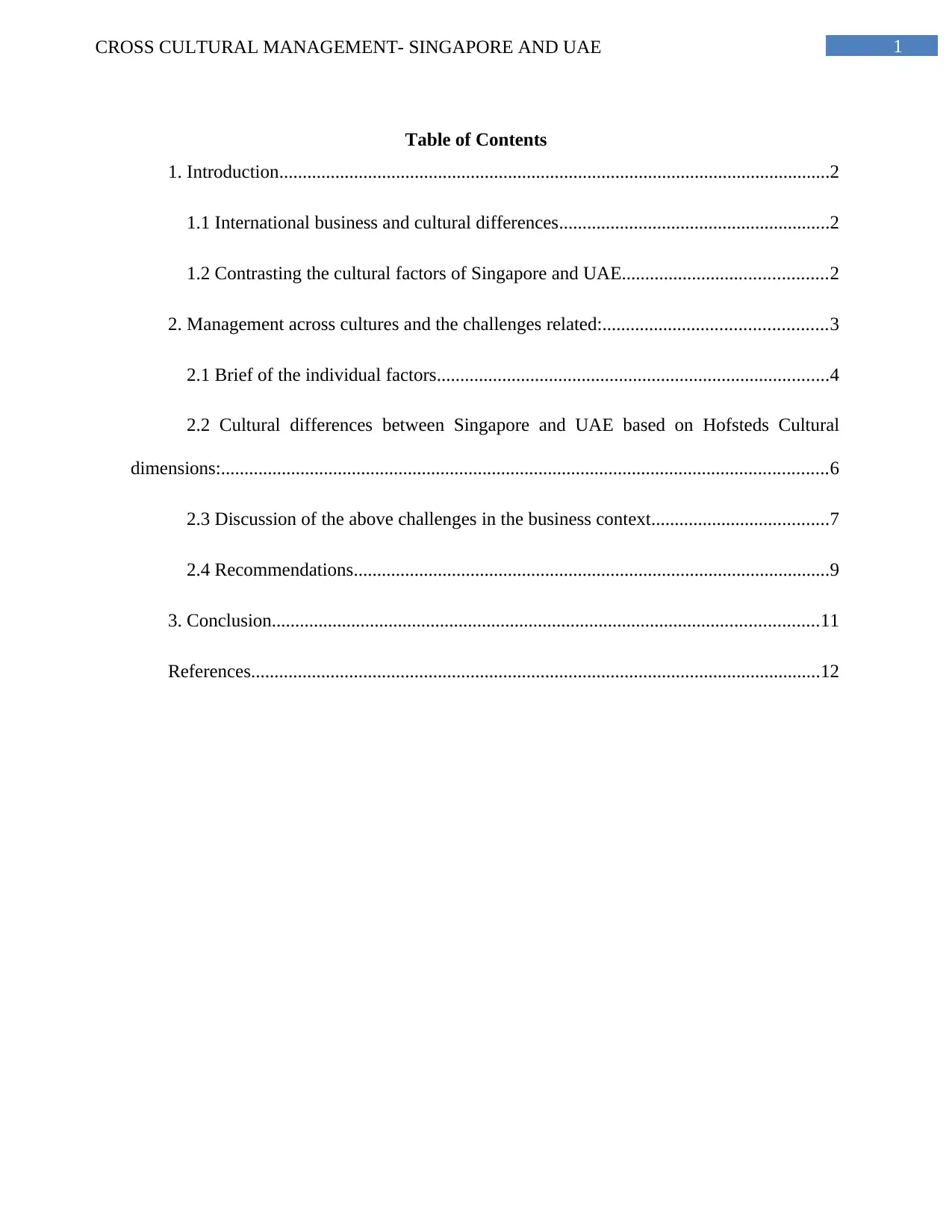
1CROSS CULTURAL MANAGEMENT- SINGAPORE AND UAE
Table of Contents
1. Introduction......................................................................................................................2
1.1 International business and cultural differences..........................................................2
1.2 Contrasting the cultural factors of Singapore and UAE............................................2
2. Management across cultures and the challenges related:................................................3
2.1 Brief of the individual factors....................................................................................4
2.2 Cultural differences between Singapore and UAE based on Hofsteds Cultural
dimensions:..................................................................................................................................6
2.3 Discussion of the above challenges in the business context......................................7
2.4 Recommendations......................................................................................................9
3. Conclusion.....................................................................................................................11
References..........................................................................................................................12
Table of Contents
1. Introduction......................................................................................................................2
1.1 International business and cultural differences..........................................................2
1.2 Contrasting the cultural factors of Singapore and UAE............................................2
2. Management across cultures and the challenges related:................................................3
2.1 Brief of the individual factors....................................................................................4
2.2 Cultural differences between Singapore and UAE based on Hofsteds Cultural
dimensions:..................................................................................................................................6
2.3 Discussion of the above challenges in the business context......................................7
2.4 Recommendations......................................................................................................9
3. Conclusion.....................................................................................................................11
References..........................................................................................................................12
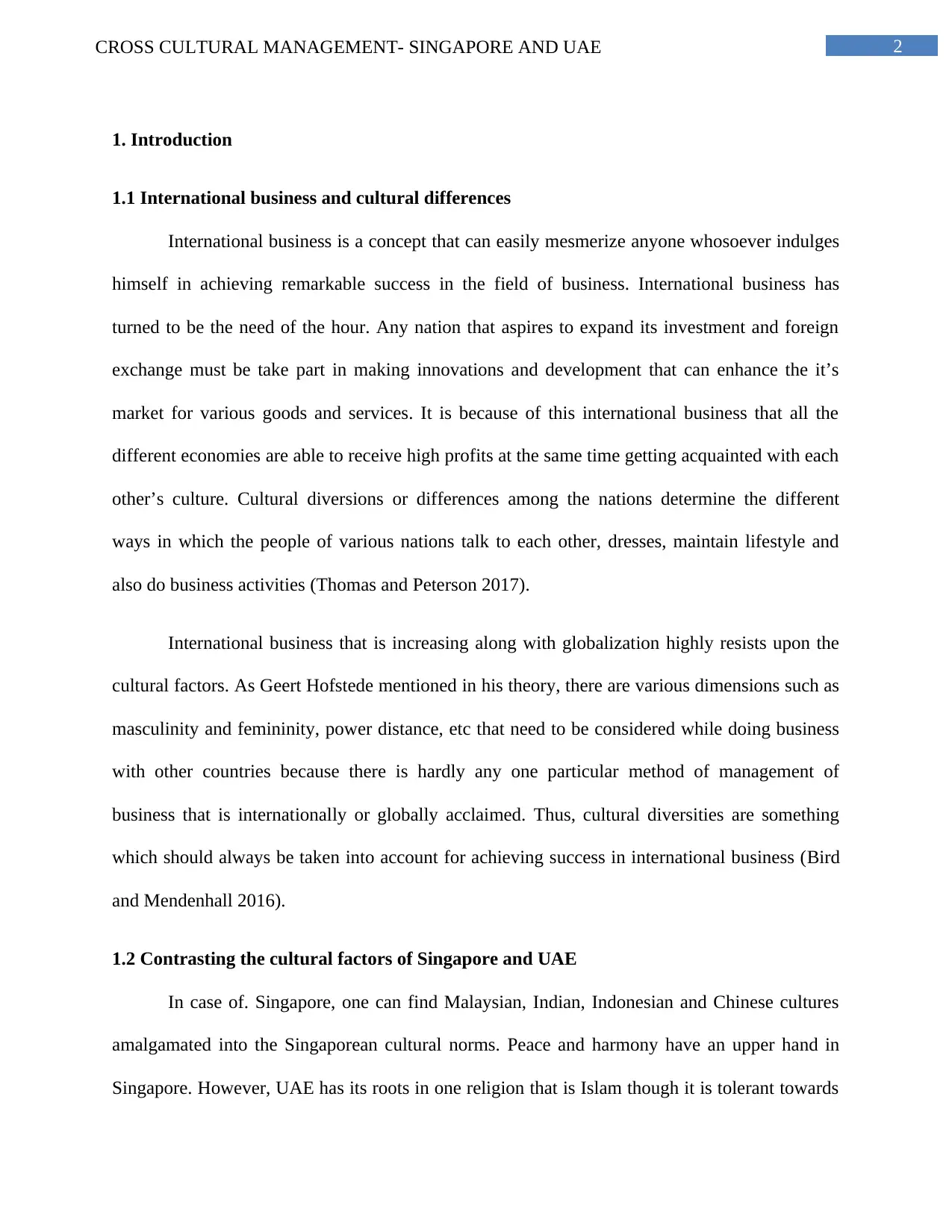
2CROSS CULTURAL MANAGEMENT- SINGAPORE AND UAE
1. Introduction
1.1 International business and cultural differences
International business is a concept that can easily mesmerize anyone whosoever indulges
himself in achieving remarkable success in the field of business. International business has
turned to be the need of the hour. Any nation that aspires to expand its investment and foreign
exchange must be take part in making innovations and development that can enhance the it’s
market for various goods and services. It is because of this international business that all the
different economies are able to receive high profits at the same time getting acquainted with each
other’s culture. Cultural diversions or differences among the nations determine the different
ways in which the people of various nations talk to each other, dresses, maintain lifestyle and
also do business activities (Thomas and Peterson 2017).
International business that is increasing along with globalization highly resists upon the
cultural factors. As Geert Hofstede mentioned in his theory, there are various dimensions such as
masculinity and femininity, power distance, etc that need to be considered while doing business
with other countries because there is hardly any one particular method of management of
business that is internationally or globally acclaimed. Thus, cultural diversities are something
which should always be taken into account for achieving success in international business (Bird
and Mendenhall 2016).
1.2 Contrasting the cultural factors of Singapore and UAE
In case of. Singapore, one can find Malaysian, Indian, Indonesian and Chinese cultures
amalgamated into the Singaporean cultural norms. Peace and harmony have an upper hand in
Singapore. However, UAE has its roots in one religion that is Islam though it is tolerant towards
1. Introduction
1.1 International business and cultural differences
International business is a concept that can easily mesmerize anyone whosoever indulges
himself in achieving remarkable success in the field of business. International business has
turned to be the need of the hour. Any nation that aspires to expand its investment and foreign
exchange must be take part in making innovations and development that can enhance the it’s
market for various goods and services. It is because of this international business that all the
different economies are able to receive high profits at the same time getting acquainted with each
other’s culture. Cultural diversions or differences among the nations determine the different
ways in which the people of various nations talk to each other, dresses, maintain lifestyle and
also do business activities (Thomas and Peterson 2017).
International business that is increasing along with globalization highly resists upon the
cultural factors. As Geert Hofstede mentioned in his theory, there are various dimensions such as
masculinity and femininity, power distance, etc that need to be considered while doing business
with other countries because there is hardly any one particular method of management of
business that is internationally or globally acclaimed. Thus, cultural diversities are something
which should always be taken into account for achieving success in international business (Bird
and Mendenhall 2016).
1.2 Contrasting the cultural factors of Singapore and UAE
In case of. Singapore, one can find Malaysian, Indian, Indonesian and Chinese cultures
amalgamated into the Singaporean cultural norms. Peace and harmony have an upper hand in
Singapore. However, UAE has its roots in one religion that is Islam though it is tolerant towards
⊘ This is a preview!⊘
Do you want full access?
Subscribe today to unlock all pages.

Trusted by 1+ million students worldwide
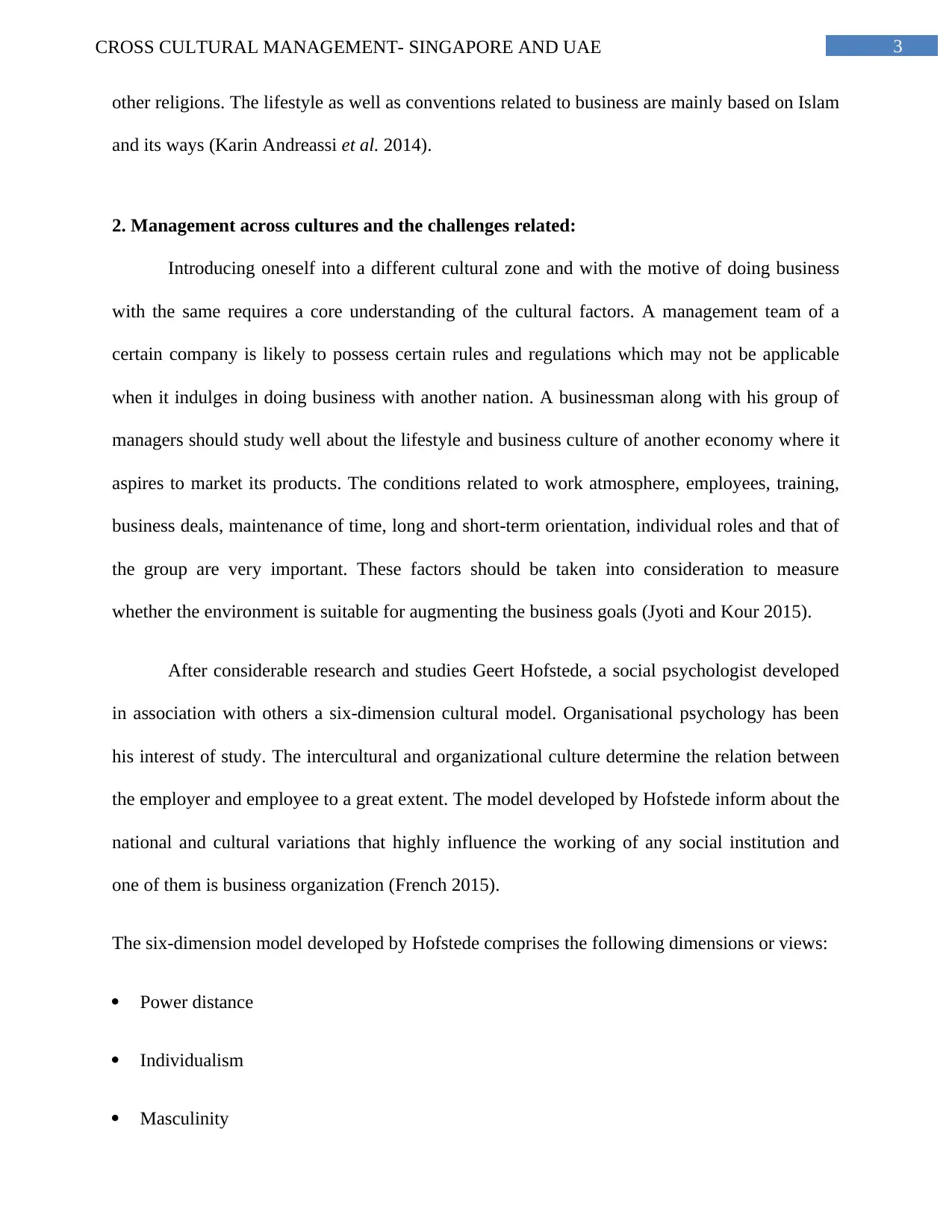
3CROSS CULTURAL MANAGEMENT- SINGAPORE AND UAE
other religions. The lifestyle as well as conventions related to business are mainly based on Islam
and its ways (Karin Andreassi et al. 2014).
2. Management across cultures and the challenges related:
Introducing oneself into a different cultural zone and with the motive of doing business
with the same requires a core understanding of the cultural factors. A management team of a
certain company is likely to possess certain rules and regulations which may not be applicable
when it indulges in doing business with another nation. A businessman along with his group of
managers should study well about the lifestyle and business culture of another economy where it
aspires to market its products. The conditions related to work atmosphere, employees, training,
business deals, maintenance of time, long and short-term orientation, individual roles and that of
the group are very important. These factors should be taken into consideration to measure
whether the environment is suitable for augmenting the business goals (Jyoti and Kour 2015).
After considerable research and studies Geert Hofstede, a social psychologist developed
in association with others a six-dimension cultural model. Organisational psychology has been
his interest of study. The intercultural and organizational culture determine the relation between
the employer and employee to a great extent. The model developed by Hofstede inform about the
national and cultural variations that highly influence the working of any social institution and
one of them is business organization (French 2015).
The six-dimension model developed by Hofstede comprises the following dimensions or views:
Power distance
Individualism
Masculinity
other religions. The lifestyle as well as conventions related to business are mainly based on Islam
and its ways (Karin Andreassi et al. 2014).
2. Management across cultures and the challenges related:
Introducing oneself into a different cultural zone and with the motive of doing business
with the same requires a core understanding of the cultural factors. A management team of a
certain company is likely to possess certain rules and regulations which may not be applicable
when it indulges in doing business with another nation. A businessman along with his group of
managers should study well about the lifestyle and business culture of another economy where it
aspires to market its products. The conditions related to work atmosphere, employees, training,
business deals, maintenance of time, long and short-term orientation, individual roles and that of
the group are very important. These factors should be taken into consideration to measure
whether the environment is suitable for augmenting the business goals (Jyoti and Kour 2015).
After considerable research and studies Geert Hofstede, a social psychologist developed
in association with others a six-dimension cultural model. Organisational psychology has been
his interest of study. The intercultural and organizational culture determine the relation between
the employer and employee to a great extent. The model developed by Hofstede inform about the
national and cultural variations that highly influence the working of any social institution and
one of them is business organization (French 2015).
The six-dimension model developed by Hofstede comprises the following dimensions or views:
Power distance
Individualism
Masculinity
Paraphrase This Document
Need a fresh take? Get an instant paraphrase of this document with our AI Paraphraser
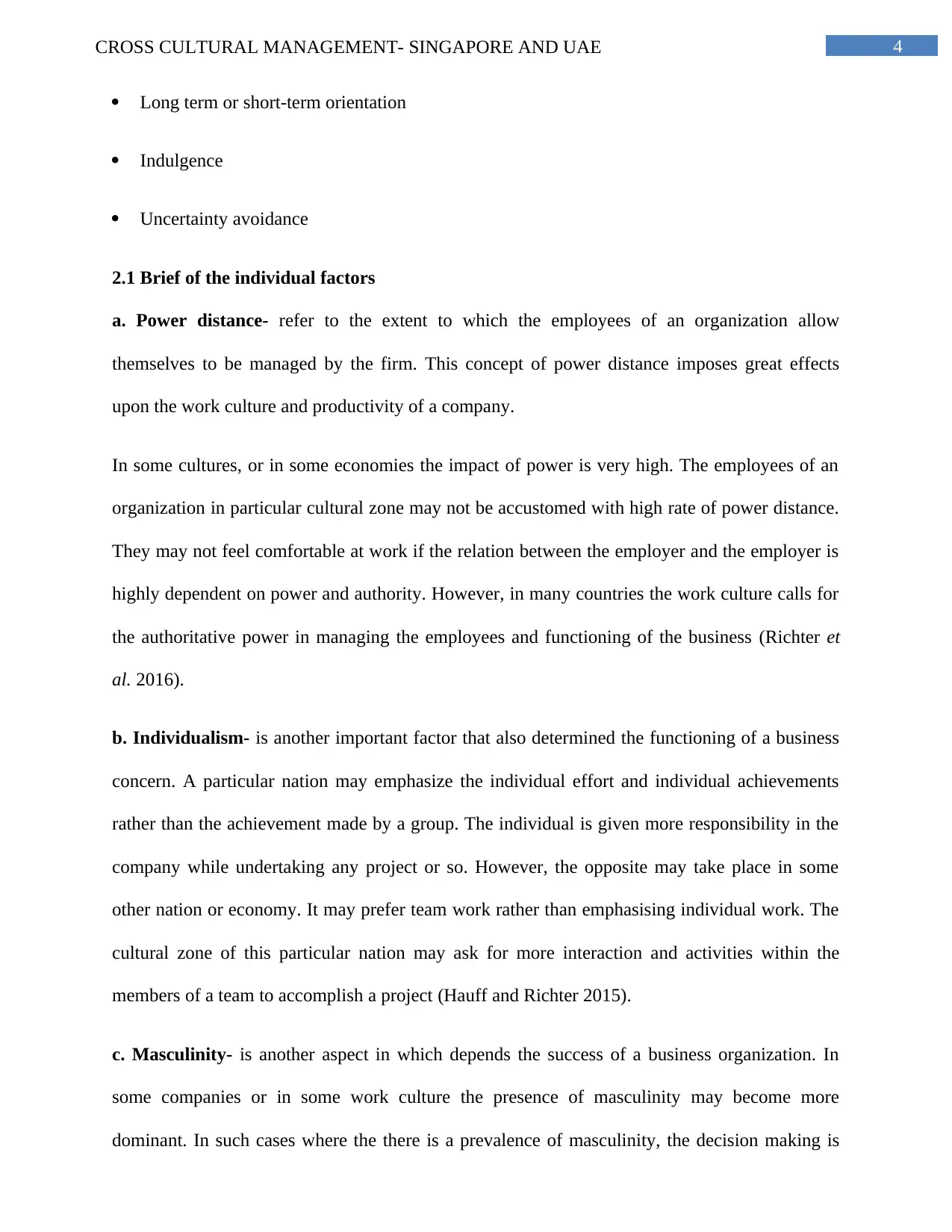
4CROSS CULTURAL MANAGEMENT- SINGAPORE AND UAE
Long term or short-term orientation
Indulgence
Uncertainty avoidance
2.1 Brief of the individual factors
a. Power distance- refer to the extent to which the employees of an organization allow
themselves to be managed by the firm. This concept of power distance imposes great effects
upon the work culture and productivity of a company.
In some cultures, or in some economies the impact of power is very high. The employees of an
organization in particular cultural zone may not be accustomed with high rate of power distance.
They may not feel comfortable at work if the relation between the employer and the employer is
highly dependent on power and authority. However, in many countries the work culture calls for
the authoritative power in managing the employees and functioning of the business (Richter et
al. 2016).
b. Individualism- is another important factor that also determined the functioning of a business
concern. A particular nation may emphasize the individual effort and individual achievements
rather than the achievement made by a group. The individual is given more responsibility in the
company while undertaking any project or so. However, the opposite may take place in some
other nation or economy. It may prefer team work rather than emphasising individual work. The
cultural zone of this particular nation may ask for more interaction and activities within the
members of a team to accomplish a project (Hauff and Richter 2015).
c. Masculinity- is another aspect in which depends the success of a business organization. In
some companies or in some work culture the presence of masculinity may become more
dominant. In such cases where the there is a prevalence of masculinity, the decision making is
Long term or short-term orientation
Indulgence
Uncertainty avoidance
2.1 Brief of the individual factors
a. Power distance- refer to the extent to which the employees of an organization allow
themselves to be managed by the firm. This concept of power distance imposes great effects
upon the work culture and productivity of a company.
In some cultures, or in some economies the impact of power is very high. The employees of an
organization in particular cultural zone may not be accustomed with high rate of power distance.
They may not feel comfortable at work if the relation between the employer and the employer is
highly dependent on power and authority. However, in many countries the work culture calls for
the authoritative power in managing the employees and functioning of the business (Richter et
al. 2016).
b. Individualism- is another important factor that also determined the functioning of a business
concern. A particular nation may emphasize the individual effort and individual achievements
rather than the achievement made by a group. The individual is given more responsibility in the
company while undertaking any project or so. However, the opposite may take place in some
other nation or economy. It may prefer team work rather than emphasising individual work. The
cultural zone of this particular nation may ask for more interaction and activities within the
members of a team to accomplish a project (Hauff and Richter 2015).
c. Masculinity- is another aspect in which depends the success of a business organization. In
some companies or in some work culture the presence of masculinity may become more
dominant. In such cases where the there is a prevalence of masculinity, the decision making is
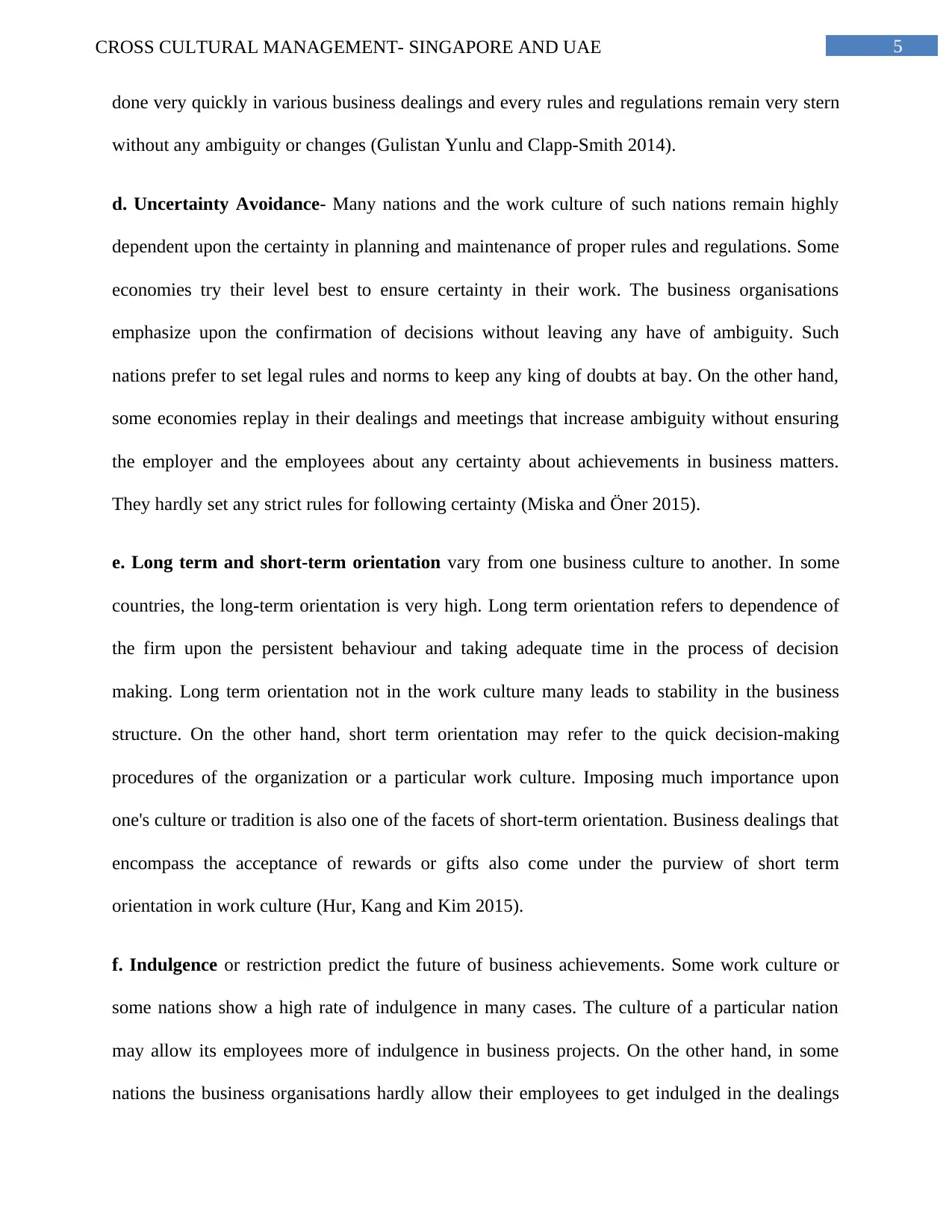
5CROSS CULTURAL MANAGEMENT- SINGAPORE AND UAE
done very quickly in various business dealings and every rules and regulations remain very stern
without any ambiguity or changes (Gulistan Yunlu and Clapp-Smith 2014).
d. Uncertainty Avoidance- Many nations and the work culture of such nations remain highly
dependent upon the certainty in planning and maintenance of proper rules and regulations. Some
economies try their level best to ensure certainty in their work. The business organisations
emphasize upon the confirmation of decisions without leaving any have of ambiguity. Such
nations prefer to set legal rules and norms to keep any king of doubts at bay. On the other hand,
some economies replay in their dealings and meetings that increase ambiguity without ensuring
the employer and the employees about any certainty about achievements in business matters.
They hardly set any strict rules for following certainty (Miska and Öner 2015).
e. Long term and short-term orientation vary from one business culture to another. In some
countries, the long-term orientation is very high. Long term orientation refers to dependence of
the firm upon the persistent behaviour and taking adequate time in the process of decision
making. Long term orientation not in the work culture many leads to stability in the business
structure. On the other hand, short term orientation may refer to the quick decision-making
procedures of the organization or a particular work culture. Imposing much importance upon
one's culture or tradition is also one of the facets of short-term orientation. Business dealings that
encompass the acceptance of rewards or gifts also come under the purview of short term
orientation in work culture (Hur, Kang and Kim 2015).
f. Indulgence or restriction predict the future of business achievements. Some work culture or
some nations show a high rate of indulgence in many cases. The culture of a particular nation
may allow its employees more of indulgence in business projects. On the other hand, in some
nations the business organisations hardly allow their employees to get indulged in the dealings
done very quickly in various business dealings and every rules and regulations remain very stern
without any ambiguity or changes (Gulistan Yunlu and Clapp-Smith 2014).
d. Uncertainty Avoidance- Many nations and the work culture of such nations remain highly
dependent upon the certainty in planning and maintenance of proper rules and regulations. Some
economies try their level best to ensure certainty in their work. The business organisations
emphasize upon the confirmation of decisions without leaving any have of ambiguity. Such
nations prefer to set legal rules and norms to keep any king of doubts at bay. On the other hand,
some economies replay in their dealings and meetings that increase ambiguity without ensuring
the employer and the employees about any certainty about achievements in business matters.
They hardly set any strict rules for following certainty (Miska and Öner 2015).
e. Long term and short-term orientation vary from one business culture to another. In some
countries, the long-term orientation is very high. Long term orientation refers to dependence of
the firm upon the persistent behaviour and taking adequate time in the process of decision
making. Long term orientation not in the work culture many leads to stability in the business
structure. On the other hand, short term orientation may refer to the quick decision-making
procedures of the organization or a particular work culture. Imposing much importance upon
one's culture or tradition is also one of the facets of short-term orientation. Business dealings that
encompass the acceptance of rewards or gifts also come under the purview of short term
orientation in work culture (Hur, Kang and Kim 2015).
f. Indulgence or restriction predict the future of business achievements. Some work culture or
some nations show a high rate of indulgence in many cases. The culture of a particular nation
may allow its employees more of indulgence in business projects. On the other hand, in some
nations the business organisations hardly allow their employees to get indulged in the dealings
⊘ This is a preview!⊘
Do you want full access?
Subscribe today to unlock all pages.

Trusted by 1+ million students worldwide
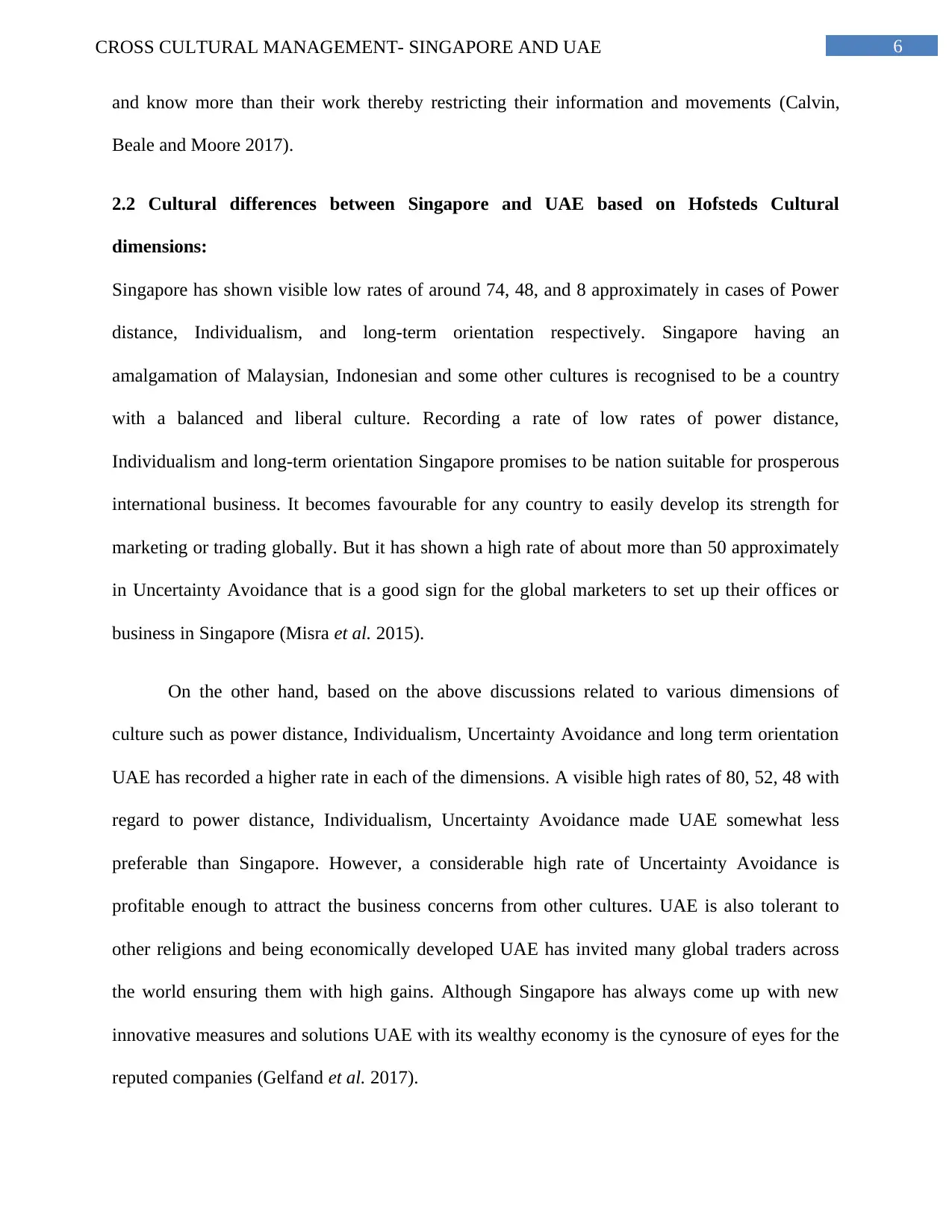
6CROSS CULTURAL MANAGEMENT- SINGAPORE AND UAE
and know more than their work thereby restricting their information and movements (Calvin,
Beale and Moore 2017).
2.2 Cultural differences between Singapore and UAE based on Hofsteds Cultural
dimensions:
Singapore has shown visible low rates of around 74, 48, and 8 approximately in cases of Power
distance, Individualism, and long-term orientation respectively. Singapore having an
amalgamation of Malaysian, Indonesian and some other cultures is recognised to be a country
with a balanced and liberal culture. Recording a rate of low rates of power distance,
Individualism and long-term orientation Singapore promises to be nation suitable for prosperous
international business. It becomes favourable for any country to easily develop its strength for
marketing or trading globally. But it has shown a high rate of about more than 50 approximately
in Uncertainty Avoidance that is a good sign for the global marketers to set up their offices or
business in Singapore (Misra et al. 2015).
On the other hand, based on the above discussions related to various dimensions of
culture such as power distance, Individualism, Uncertainty Avoidance and long term orientation
UAE has recorded a higher rate in each of the dimensions. A visible high rates of 80, 52, 48 with
regard to power distance, Individualism, Uncertainty Avoidance made UAE somewhat less
preferable than Singapore. However, a considerable high rate of Uncertainty Avoidance is
profitable enough to attract the business concerns from other cultures. UAE is also tolerant to
other religions and being economically developed UAE has invited many global traders across
the world ensuring them with high gains. Although Singapore has always come up with new
innovative measures and solutions UAE with its wealthy economy is the cynosure of eyes for the
reputed companies (Gelfand et al. 2017).
and know more than their work thereby restricting their information and movements (Calvin,
Beale and Moore 2017).
2.2 Cultural differences between Singapore and UAE based on Hofsteds Cultural
dimensions:
Singapore has shown visible low rates of around 74, 48, and 8 approximately in cases of Power
distance, Individualism, and long-term orientation respectively. Singapore having an
amalgamation of Malaysian, Indonesian and some other cultures is recognised to be a country
with a balanced and liberal culture. Recording a rate of low rates of power distance,
Individualism and long-term orientation Singapore promises to be nation suitable for prosperous
international business. It becomes favourable for any country to easily develop its strength for
marketing or trading globally. But it has shown a high rate of about more than 50 approximately
in Uncertainty Avoidance that is a good sign for the global marketers to set up their offices or
business in Singapore (Misra et al. 2015).
On the other hand, based on the above discussions related to various dimensions of
culture such as power distance, Individualism, Uncertainty Avoidance and long term orientation
UAE has recorded a higher rate in each of the dimensions. A visible high rates of 80, 52, 48 with
regard to power distance, Individualism, Uncertainty Avoidance made UAE somewhat less
preferable than Singapore. However, a considerable high rate of Uncertainty Avoidance is
profitable enough to attract the business concerns from other cultures. UAE is also tolerant to
other religions and being economically developed UAE has invited many global traders across
the world ensuring them with high gains. Although Singapore has always come up with new
innovative measures and solutions UAE with its wealthy economy is the cynosure of eyes for the
reputed companies (Gelfand et al. 2017).
Paraphrase This Document
Need a fresh take? Get an instant paraphrase of this document with our AI Paraphraser
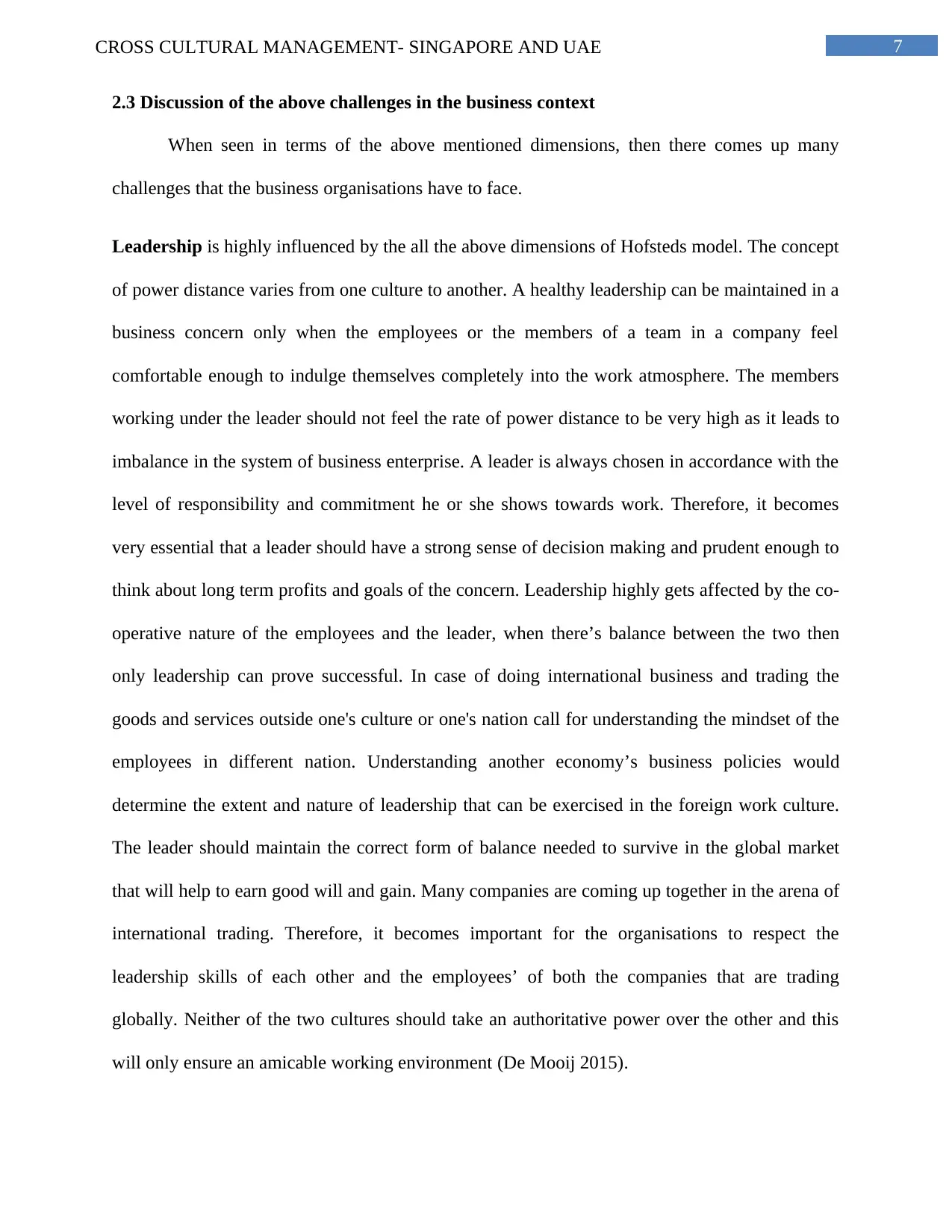
7CROSS CULTURAL MANAGEMENT- SINGAPORE AND UAE
2.3 Discussion of the above challenges in the business context
When seen in terms of the above mentioned dimensions, then there comes up many
challenges that the business organisations have to face.
Leadership is highly influenced by the all the above dimensions of Hofsteds model. The concept
of power distance varies from one culture to another. A healthy leadership can be maintained in a
business concern only when the employees or the members of a team in a company feel
comfortable enough to indulge themselves completely into the work atmosphere. The members
working under the leader should not feel the rate of power distance to be very high as it leads to
imbalance in the system of business enterprise. A leader is always chosen in accordance with the
level of responsibility and commitment he or she shows towards work. Therefore, it becomes
very essential that a leader should have a strong sense of decision making and prudent enough to
think about long term profits and goals of the concern. Leadership highly gets affected by the co-
operative nature of the employees and the leader, when there’s balance between the two then
only leadership can prove successful. In case of doing international business and trading the
goods and services outside one's culture or one's nation call for understanding the mindset of the
employees in different nation. Understanding another economy’s business policies would
determine the extent and nature of leadership that can be exercised in the foreign work culture.
The leader should maintain the correct form of balance needed to survive in the global market
that will help to earn good will and gain. Many companies are coming up together in the arena of
international trading. Therefore, it becomes important for the organisations to respect the
leadership skills of each other and the employees’ of both the companies that are trading
globally. Neither of the two cultures should take an authoritative power over the other and this
will only ensure an amicable working environment (De Mooij 2015).
2.3 Discussion of the above challenges in the business context
When seen in terms of the above mentioned dimensions, then there comes up many
challenges that the business organisations have to face.
Leadership is highly influenced by the all the above dimensions of Hofsteds model. The concept
of power distance varies from one culture to another. A healthy leadership can be maintained in a
business concern only when the employees or the members of a team in a company feel
comfortable enough to indulge themselves completely into the work atmosphere. The members
working under the leader should not feel the rate of power distance to be very high as it leads to
imbalance in the system of business enterprise. A leader is always chosen in accordance with the
level of responsibility and commitment he or she shows towards work. Therefore, it becomes
very essential that a leader should have a strong sense of decision making and prudent enough to
think about long term profits and goals of the concern. Leadership highly gets affected by the co-
operative nature of the employees and the leader, when there’s balance between the two then
only leadership can prove successful. In case of doing international business and trading the
goods and services outside one's culture or one's nation call for understanding the mindset of the
employees in different nation. Understanding another economy’s business policies would
determine the extent and nature of leadership that can be exercised in the foreign work culture.
The leader should maintain the correct form of balance needed to survive in the global market
that will help to earn good will and gain. Many companies are coming up together in the arena of
international trading. Therefore, it becomes important for the organisations to respect the
leadership skills of each other and the employees’ of both the companies that are trading
globally. Neither of the two cultures should take an authoritative power over the other and this
will only ensure an amicable working environment (De Mooij 2015).
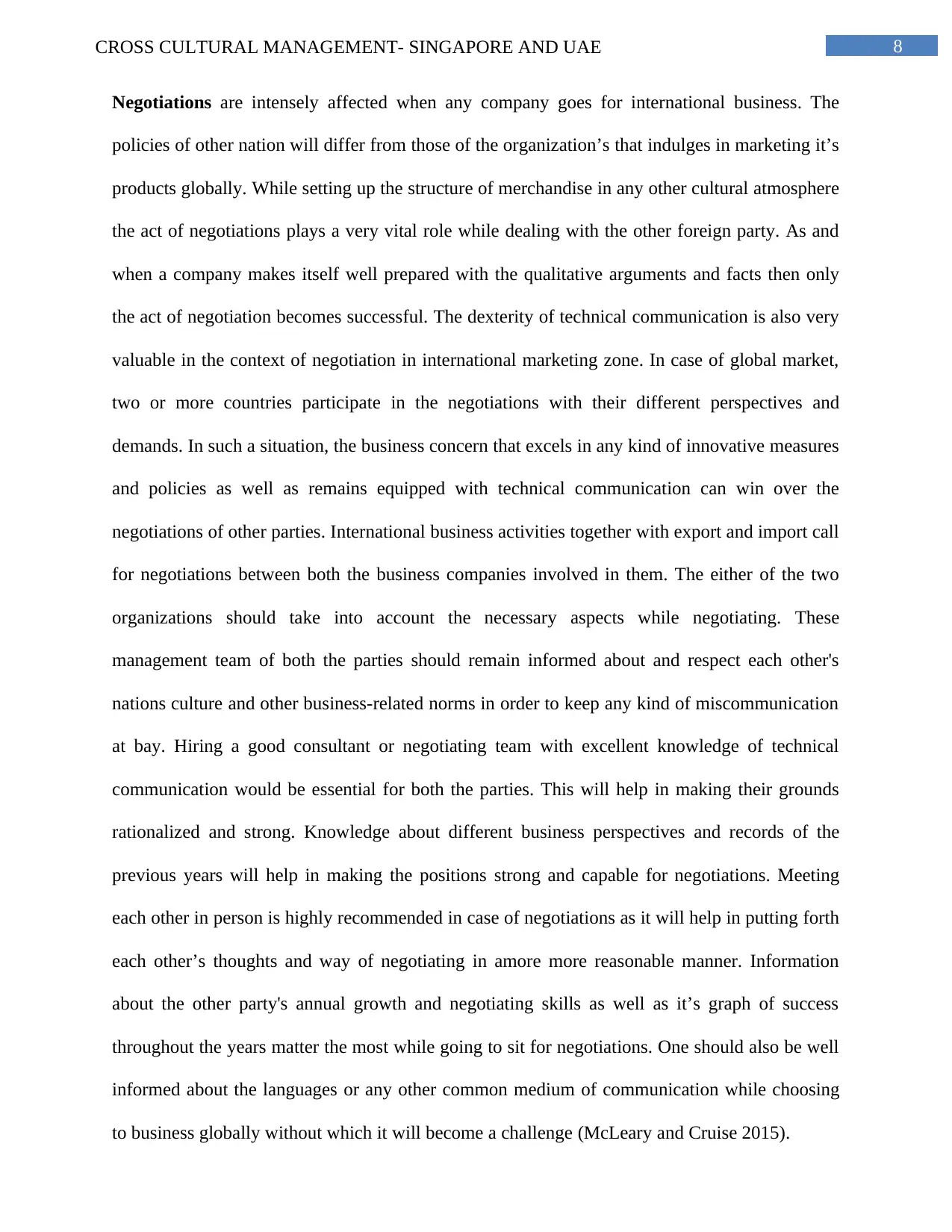
8CROSS CULTURAL MANAGEMENT- SINGAPORE AND UAE
Negotiations are intensely affected when any company goes for international business. The
policies of other nation will differ from those of the organization’s that indulges in marketing it’s
products globally. While setting up the structure of merchandise in any other cultural atmosphere
the act of negotiations plays a very vital role while dealing with the other foreign party. As and
when a company makes itself well prepared with the qualitative arguments and facts then only
the act of negotiation becomes successful. The dexterity of technical communication is also very
valuable in the context of negotiation in international marketing zone. In case of global market,
two or more countries participate in the negotiations with their different perspectives and
demands. In such a situation, the business concern that excels in any kind of innovative measures
and policies as well as remains equipped with technical communication can win over the
negotiations of other parties. International business activities together with export and import call
for negotiations between both the business companies involved in them. The either of the two
organizations should take into account the necessary aspects while negotiating. These
management team of both the parties should remain informed about and respect each other's
nations culture and other business-related norms in order to keep any kind of miscommunication
at bay. Hiring a good consultant or negotiating team with excellent knowledge of technical
communication would be essential for both the parties. This will help in making their grounds
rationalized and strong. Knowledge about different business perspectives and records of the
previous years will help in making the positions strong and capable for negotiations. Meeting
each other in person is highly recommended in case of negotiations as it will help in putting forth
each other’s thoughts and way of negotiating in amore more reasonable manner. Information
about the other party's annual growth and negotiating skills as well as it’s graph of success
throughout the years matter the most while going to sit for negotiations. One should also be well
informed about the languages or any other common medium of communication while choosing
to business globally without which it will become a challenge (McLeary and Cruise 2015).
Negotiations are intensely affected when any company goes for international business. The
policies of other nation will differ from those of the organization’s that indulges in marketing it’s
products globally. While setting up the structure of merchandise in any other cultural atmosphere
the act of negotiations plays a very vital role while dealing with the other foreign party. As and
when a company makes itself well prepared with the qualitative arguments and facts then only
the act of negotiation becomes successful. The dexterity of technical communication is also very
valuable in the context of negotiation in international marketing zone. In case of global market,
two or more countries participate in the negotiations with their different perspectives and
demands. In such a situation, the business concern that excels in any kind of innovative measures
and policies as well as remains equipped with technical communication can win over the
negotiations of other parties. International business activities together with export and import call
for negotiations between both the business companies involved in them. The either of the two
organizations should take into account the necessary aspects while negotiating. These
management team of both the parties should remain informed about and respect each other's
nations culture and other business-related norms in order to keep any kind of miscommunication
at bay. Hiring a good consultant or negotiating team with excellent knowledge of technical
communication would be essential for both the parties. This will help in making their grounds
rationalized and strong. Knowledge about different business perspectives and records of the
previous years will help in making the positions strong and capable for negotiations. Meeting
each other in person is highly recommended in case of negotiations as it will help in putting forth
each other’s thoughts and way of negotiating in amore more reasonable manner. Information
about the other party's annual growth and negotiating skills as well as it’s graph of success
throughout the years matter the most while going to sit for negotiations. One should also be well
informed about the languages or any other common medium of communication while choosing
to business globally without which it will become a challenge (McLeary and Cruise 2015).
⊘ This is a preview!⊘
Do you want full access?
Subscribe today to unlock all pages.

Trusted by 1+ million students worldwide
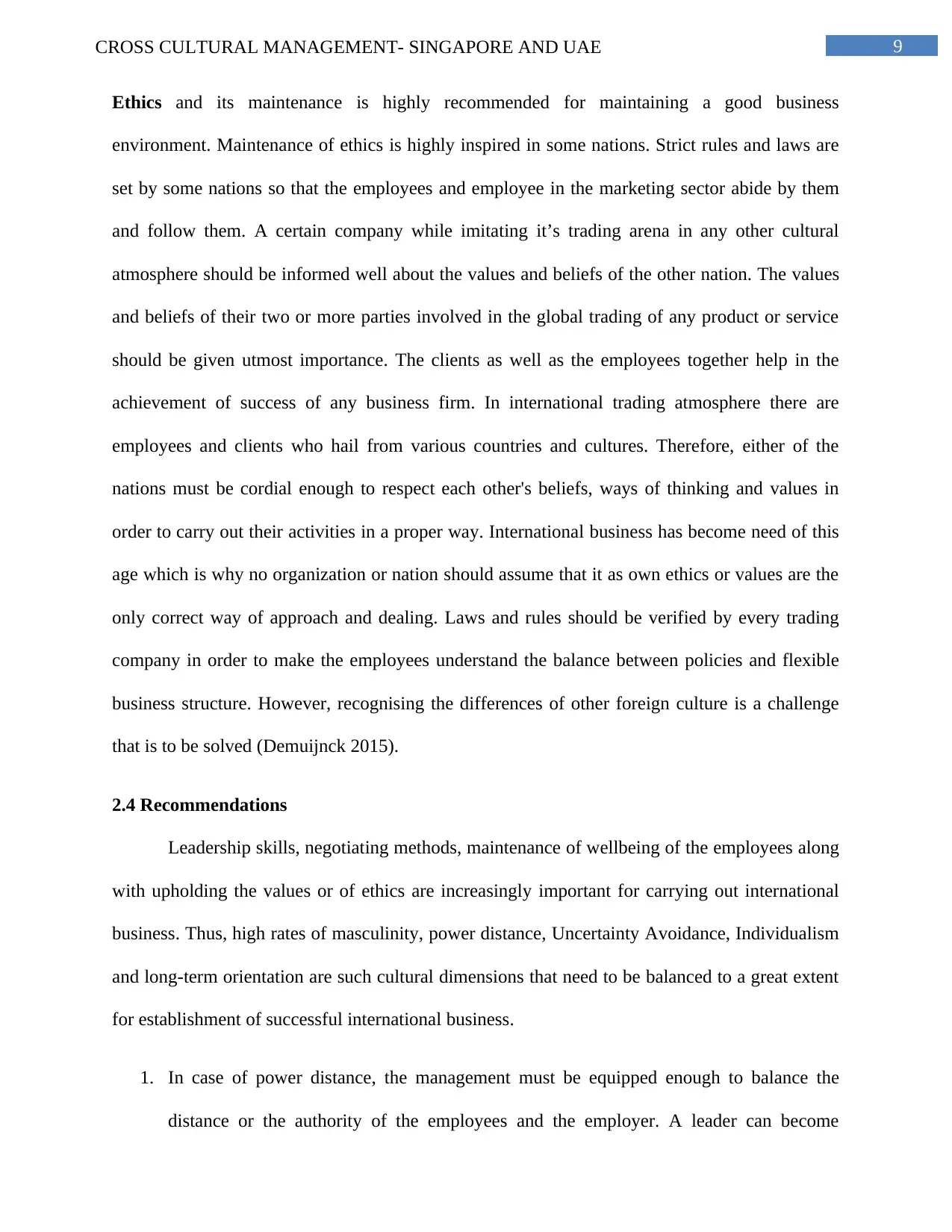
9CROSS CULTURAL MANAGEMENT- SINGAPORE AND UAE
Ethics and its maintenance is highly recommended for maintaining a good business
environment. Maintenance of ethics is highly inspired in some nations. Strict rules and laws are
set by some nations so that the employees and employee in the marketing sector abide by them
and follow them. A certain company while imitating it’s trading arena in any other cultural
atmosphere should be informed well about the values and beliefs of the other nation. The values
and beliefs of their two or more parties involved in the global trading of any product or service
should be given utmost importance. The clients as well as the employees together help in the
achievement of success of any business firm. In international trading atmosphere there are
employees and clients who hail from various countries and cultures. Therefore, either of the
nations must be cordial enough to respect each other's beliefs, ways of thinking and values in
order to carry out their activities in a proper way. International business has become need of this
age which is why no organization or nation should assume that it as own ethics or values are the
only correct way of approach and dealing. Laws and rules should be verified by every trading
company in order to make the employees understand the balance between policies and flexible
business structure. However, recognising the differences of other foreign culture is a challenge
that is to be solved (Demuijnck 2015).
2.4 Recommendations
Leadership skills, negotiating methods, maintenance of wellbeing of the employees along
with upholding the values or of ethics are increasingly important for carrying out international
business. Thus, high rates of masculinity, power distance, Uncertainty Avoidance, Individualism
and long-term orientation are such cultural dimensions that need to be balanced to a great extent
for establishment of successful international business.
1. In case of power distance, the management must be equipped enough to balance the
distance or the authority of the employees and the employer. A leader can become
Ethics and its maintenance is highly recommended for maintaining a good business
environment. Maintenance of ethics is highly inspired in some nations. Strict rules and laws are
set by some nations so that the employees and employee in the marketing sector abide by them
and follow them. A certain company while imitating it’s trading arena in any other cultural
atmosphere should be informed well about the values and beliefs of the other nation. The values
and beliefs of their two or more parties involved in the global trading of any product or service
should be given utmost importance. The clients as well as the employees together help in the
achievement of success of any business firm. In international trading atmosphere there are
employees and clients who hail from various countries and cultures. Therefore, either of the
nations must be cordial enough to respect each other's beliefs, ways of thinking and values in
order to carry out their activities in a proper way. International business has become need of this
age which is why no organization or nation should assume that it as own ethics or values are the
only correct way of approach and dealing. Laws and rules should be verified by every trading
company in order to make the employees understand the balance between policies and flexible
business structure. However, recognising the differences of other foreign culture is a challenge
that is to be solved (Demuijnck 2015).
2.4 Recommendations
Leadership skills, negotiating methods, maintenance of wellbeing of the employees along
with upholding the values or of ethics are increasingly important for carrying out international
business. Thus, high rates of masculinity, power distance, Uncertainty Avoidance, Individualism
and long-term orientation are such cultural dimensions that need to be balanced to a great extent
for establishment of successful international business.
1. In case of power distance, the management must be equipped enough to balance the
distance or the authority of the employees and the employer. A leader can become
Paraphrase This Document
Need a fresh take? Get an instant paraphrase of this document with our AI Paraphraser
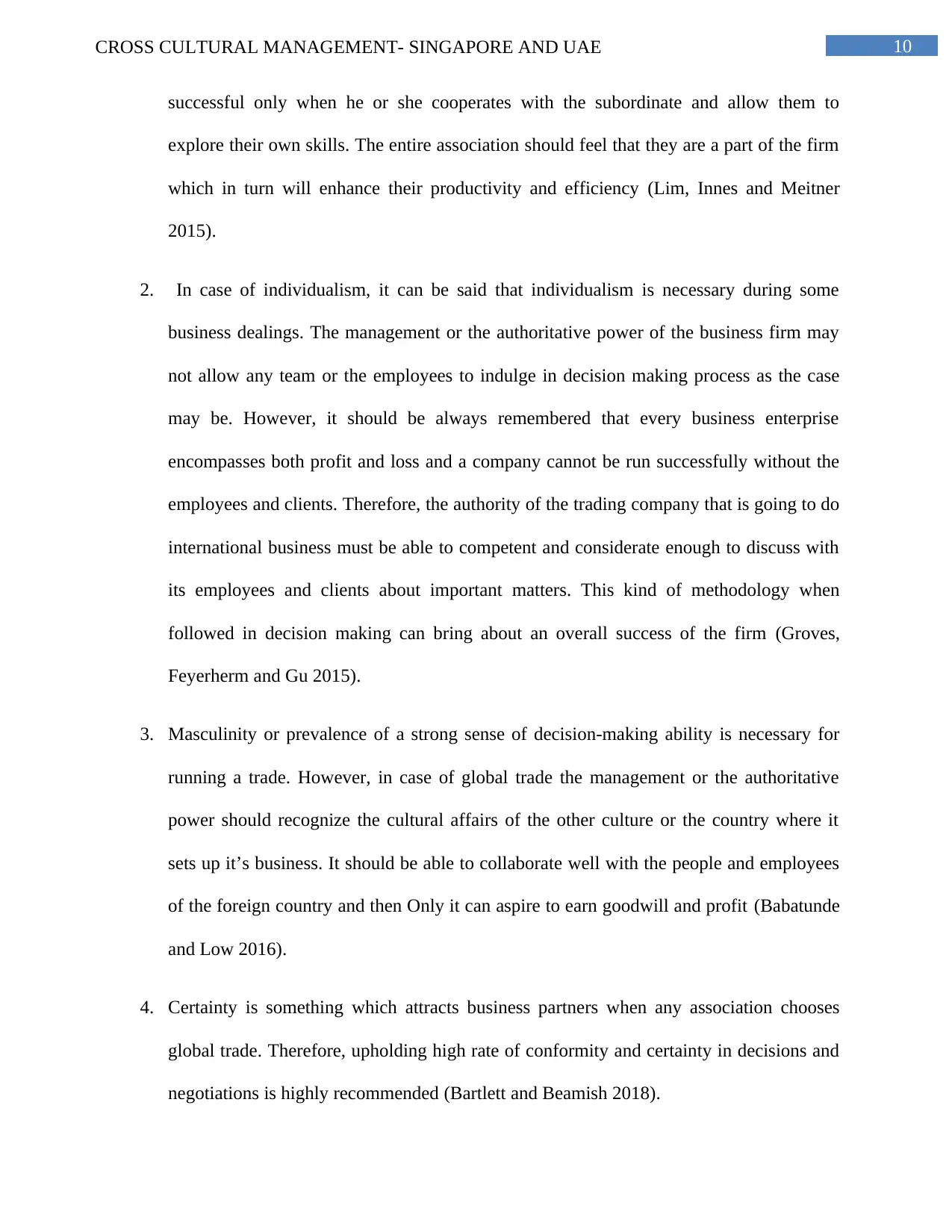
10CROSS CULTURAL MANAGEMENT- SINGAPORE AND UAE
successful only when he or she cooperates with the subordinate and allow them to
explore their own skills. The entire association should feel that they are a part of the firm
which in turn will enhance their productivity and efficiency (Lim, Innes and Meitner
2015).
2. In case of individualism, it can be said that individualism is necessary during some
business dealings. The management or the authoritative power of the business firm may
not allow any team or the employees to indulge in decision making process as the case
may be. However, it should be always remembered that every business enterprise
encompasses both profit and loss and a company cannot be run successfully without the
employees and clients. Therefore, the authority of the trading company that is going to do
international business must be able to competent and considerate enough to discuss with
its employees and clients about important matters. This kind of methodology when
followed in decision making can bring about an overall success of the firm (Groves,
Feyerherm and Gu 2015).
3. Masculinity or prevalence of a strong sense of decision-making ability is necessary for
running a trade. However, in case of global trade the management or the authoritative
power should recognize the cultural affairs of the other culture or the country where it
sets up it’s business. It should be able to collaborate well with the people and employees
of the foreign country and then Only it can aspire to earn goodwill and profit (Babatunde
and Low 2016).
4. Certainty is something which attracts business partners when any association chooses
global trade. Therefore, upholding high rate of conformity and certainty in decisions and
negotiations is highly recommended (Bartlett and Beamish 2018).
successful only when he or she cooperates with the subordinate and allow them to
explore their own skills. The entire association should feel that they are a part of the firm
which in turn will enhance their productivity and efficiency (Lim, Innes and Meitner
2015).
2. In case of individualism, it can be said that individualism is necessary during some
business dealings. The management or the authoritative power of the business firm may
not allow any team or the employees to indulge in decision making process as the case
may be. However, it should be always remembered that every business enterprise
encompasses both profit and loss and a company cannot be run successfully without the
employees and clients. Therefore, the authority of the trading company that is going to do
international business must be able to competent and considerate enough to discuss with
its employees and clients about important matters. This kind of methodology when
followed in decision making can bring about an overall success of the firm (Groves,
Feyerherm and Gu 2015).
3. Masculinity or prevalence of a strong sense of decision-making ability is necessary for
running a trade. However, in case of global trade the management or the authoritative
power should recognize the cultural affairs of the other culture or the country where it
sets up it’s business. It should be able to collaborate well with the people and employees
of the foreign country and then Only it can aspire to earn goodwill and profit (Babatunde
and Low 2016).
4. Certainty is something which attracts business partners when any association chooses
global trade. Therefore, upholding high rate of conformity and certainty in decisions and
negotiations is highly recommended (Bartlett and Beamish 2018).
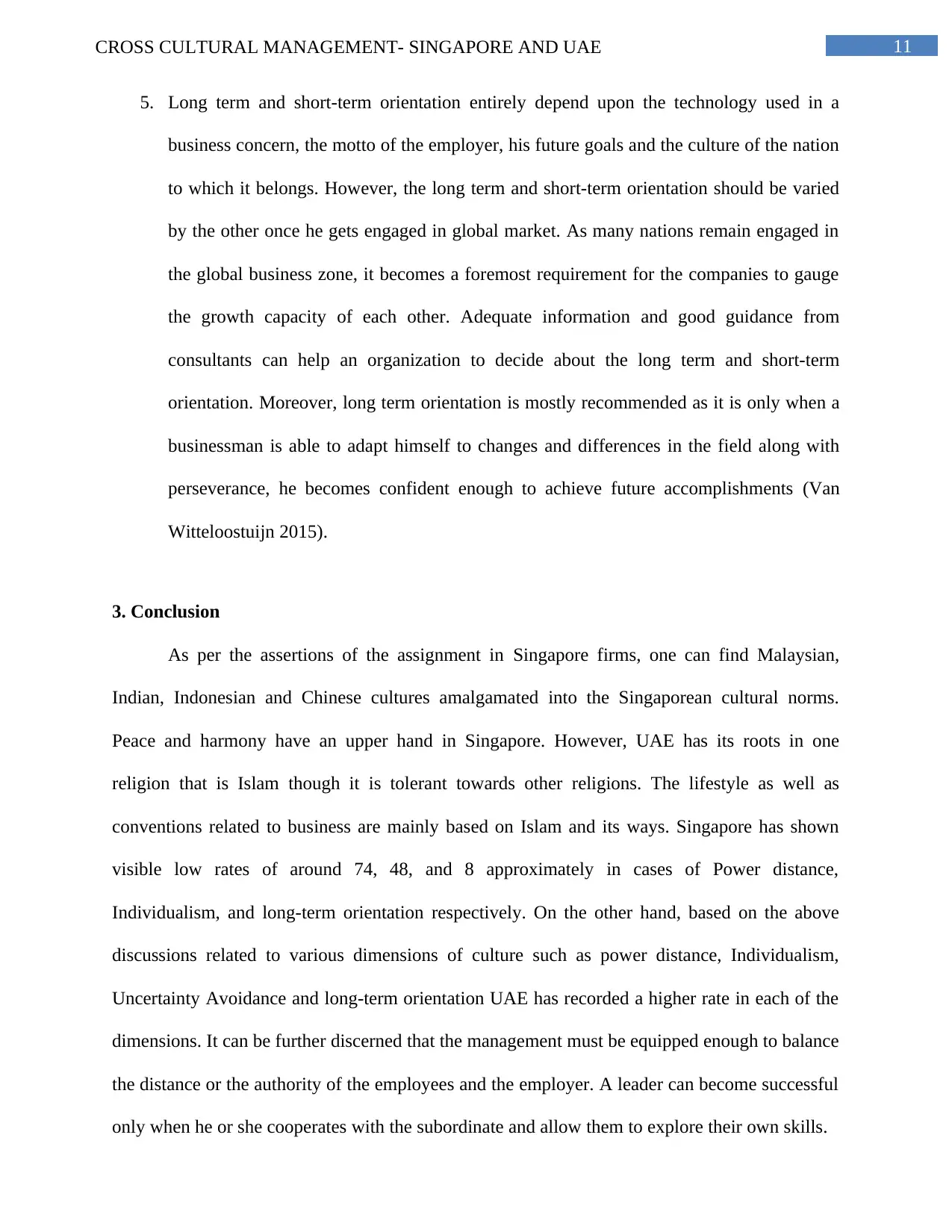
11CROSS CULTURAL MANAGEMENT- SINGAPORE AND UAE
5. Long term and short-term orientation entirely depend upon the technology used in a
business concern, the motto of the employer, his future goals and the culture of the nation
to which it belongs. However, the long term and short-term orientation should be varied
by the other once he gets engaged in global market. As many nations remain engaged in
the global business zone, it becomes a foremost requirement for the companies to gauge
the growth capacity of each other. Adequate information and good guidance from
consultants can help an organization to decide about the long term and short-term
orientation. Moreover, long term orientation is mostly recommended as it is only when a
businessman is able to adapt himself to changes and differences in the field along with
perseverance, he becomes confident enough to achieve future accomplishments (Van
Witteloostuijn 2015).
3. Conclusion
As per the assertions of the assignment in Singapore firms, one can find Malaysian,
Indian, Indonesian and Chinese cultures amalgamated into the Singaporean cultural norms.
Peace and harmony have an upper hand in Singapore. However, UAE has its roots in one
religion that is Islam though it is tolerant towards other religions. The lifestyle as well as
conventions related to business are mainly based on Islam and its ways. Singapore has shown
visible low rates of around 74, 48, and 8 approximately in cases of Power distance,
Individualism, and long-term orientation respectively. On the other hand, based on the above
discussions related to various dimensions of culture such as power distance, Individualism,
Uncertainty Avoidance and long-term orientation UAE has recorded a higher rate in each of the
dimensions. It can be further discerned that the management must be equipped enough to balance
the distance or the authority of the employees and the employer. A leader can become successful
only when he or she cooperates with the subordinate and allow them to explore their own skills.
5. Long term and short-term orientation entirely depend upon the technology used in a
business concern, the motto of the employer, his future goals and the culture of the nation
to which it belongs. However, the long term and short-term orientation should be varied
by the other once he gets engaged in global market. As many nations remain engaged in
the global business zone, it becomes a foremost requirement for the companies to gauge
the growth capacity of each other. Adequate information and good guidance from
consultants can help an organization to decide about the long term and short-term
orientation. Moreover, long term orientation is mostly recommended as it is only when a
businessman is able to adapt himself to changes and differences in the field along with
perseverance, he becomes confident enough to achieve future accomplishments (Van
Witteloostuijn 2015).
3. Conclusion
As per the assertions of the assignment in Singapore firms, one can find Malaysian,
Indian, Indonesian and Chinese cultures amalgamated into the Singaporean cultural norms.
Peace and harmony have an upper hand in Singapore. However, UAE has its roots in one
religion that is Islam though it is tolerant towards other religions. The lifestyle as well as
conventions related to business are mainly based on Islam and its ways. Singapore has shown
visible low rates of around 74, 48, and 8 approximately in cases of Power distance,
Individualism, and long-term orientation respectively. On the other hand, based on the above
discussions related to various dimensions of culture such as power distance, Individualism,
Uncertainty Avoidance and long-term orientation UAE has recorded a higher rate in each of the
dimensions. It can be further discerned that the management must be equipped enough to balance
the distance or the authority of the employees and the employer. A leader can become successful
only when he or she cooperates with the subordinate and allow them to explore their own skills.
⊘ This is a preview!⊘
Do you want full access?
Subscribe today to unlock all pages.

Trusted by 1+ million students worldwide
1 out of 15
Related Documents
Your All-in-One AI-Powered Toolkit for Academic Success.
+13062052269
info@desklib.com
Available 24*7 on WhatsApp / Email
![[object Object]](/_next/static/media/star-bottom.7253800d.svg)
Unlock your academic potential
Copyright © 2020–2025 A2Z Services. All Rights Reserved. Developed and managed by ZUCOL.





